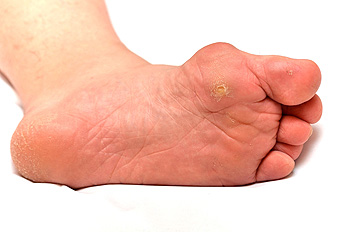 If you have developed a bunion, you may be aware of a structural deformity of the foot. It is considered to be a bone disorder, and affects the big toe. Obvious symptoms that may accompany this condition can include a bony protrusion on the side of the big toe, pain and discomfort, and possibly limited mobility of the affected toe. Bunions typically cause the big toe to move toward the toe next to it, and this is the reason for the joint to extend outward. There are several reasons why bunions may occur, and these may include genetic traits, medical conditions such as arthritis, or foot injuries that may have happened. There are specific foot issues, which may develop as a result of having a bunion, including hammertoe, bursitis, or calluses. It is important to be under the care of a podiatrist who can properly diagnosis this condition, and offer correct treatment techniques.
If you have developed a bunion, you may be aware of a structural deformity of the foot. It is considered to be a bone disorder, and affects the big toe. Obvious symptoms that may accompany this condition can include a bony protrusion on the side of the big toe, pain and discomfort, and possibly limited mobility of the affected toe. Bunions typically cause the big toe to move toward the toe next to it, and this is the reason for the joint to extend outward. There are several reasons why bunions may occur, and these may include genetic traits, medical conditions such as arthritis, or foot injuries that may have happened. There are specific foot issues, which may develop as a result of having a bunion, including hammertoe, bursitis, or calluses. It is important to be under the care of a podiatrist who can properly diagnosis this condition, and offer correct treatment techniques.
If you are suffering from bunions, contact one of our podiatrists of New York Foot and Ankle. Our doctors can provide the care you need to keep you pain-free and on your feet.
What Is a Bunion?
A bunion is formed of swollen tissue or an enlargement of boney growth, usually located at the base joint of the toe that connects to the foot. The swelling occurs due to the bones in the big toe shifting inward, which impacts the other toes of the foot. This causes the area around the base of the big toe to become inflamed and painful.
Why Do Bunions Form?
Genetics – Susceptibility to bunions are often hereditary
Stress on the feet – Poorly fitted and uncomfortable footwear that places stress on feet, such as heels, can worsen existing bunions
How Are Bunions Diagnosed?
Doctors often perform two tests – blood tests and x-rays – when trying to diagnose bunions, especially in the early stages of development. Blood tests help determine if the foot pain is being caused by something else, such as arthritis, while x-rays provide a clear picture of your bone structure to your doctor.
How Are Bunions Treated?
- Refrain from wearing heels or similar shoes that cause discomfort
- Select wider shoes that can provide more comfort and reduce pain
- Anti-inflammatory and pain management drugs
- Orthotics or foot inserts
- Surgery
If you have any questions, please feel free to contact one of our offices located in Franklin Square, Bethpage, Brooklyn, and Massapequa, NY . We offer the newest diagnostic and treatment technologies for all your foot care needs.
